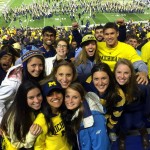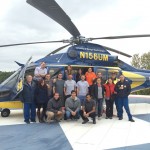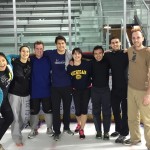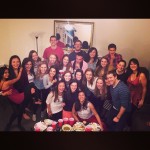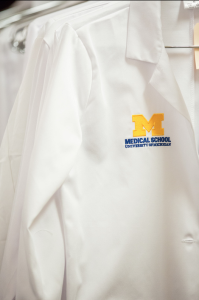Finding a New Normal
I have to apologize for my lengthy writing hiatus these past couple months—turns out it can take a little while to adjust to the pace and demands of medical school life! It’s my hope that I can write much more regularly from this point forward.
I’ve been thinking about a lot recently about the word “normal,” a topic that my FCE (Family Centered Experience) instructor brought up in our small group way back in September. Dr. Rodgers urged us to take note of how physicians use the word “normal” in their daily interactions with patients, as the word could be both reassuring and stigmatizing depending on the circumstances. He emphasized just how important the idea of what constitutes “normal” can play in patients’ attitudes towards themselves and their illness, and how patients often struggle with adapting to new levels of “normal” as their lives are irrevocably altered by their changing health needs.
I recently spoke with a patient (whom I’ll call Ms. A) who was very ill and had chosen to pursue palliative care as she ventured into the twilight of her life. Ms. A had volunteered time out of her schedule to speak with medical students and educate us about the multiple diseases to which she will ultimately succumb—all of this in spite of doctors telling her that she had 18-24 months left to live, a timeline she has now far exceeded. She had every reason to distrust the medical profession; from botched diagnoses to conflicting strategies for her care to impersonal interactions with physicians, it was miraculous to me that Ms. A would volunteer to give up her time to teach medical students like myself. It was truly inspiring and remarkable to see someone maintain her sense of humor, optimism, and general life vigor in the face of such dire circumstances.
I couldn’t help but think, “How does she do it? How can she keep a positive attitude in the face of such a massive amount of adversity?” I was able to catch up with Ms. A after our group session, and she graciously gave me her answers. She told me that she tries to stay positive because she has no other choice—while she didn’t choose to be inflicted with her terminal condition, she has the ability to choose her attitude towards dying and her outlook on the remaining time she has left in her life. She also admitted that not every day was a happy one, and she spoke of days where she couldn’t help but cry her eyes out, wondering why she had been given such a tragic fate. But after the tears dried, her face puffy and nose clogged, she would move forward because she had to. In her mind, there was just no other way. Ms. A told me she didn’t have to be at peace with her condition, but that she couldn’t reject or deny it either.
I likely won’t ever see Ms. A again, and I don’t know that I’ll even find out if and when she passes on from this life. But she reminded me of a very important lesson, and it’s that we have to work with the cards that we’re dealt. Throughout our lives we will always be faced with changing life circumstances, and it’s not always easy to adapt to a new level of normal. Even if we think we know what to expect, the truth can come out of left field like cold brick wall, leaving us feeling lost, exposed, and worst of all, hopeless. I know that I have much to learn over the course of my medical career, but I hope that I can remember to stay grounded and compassionate when working with my future patients, no matter how busy or tired I may be. As I gain more clinical exposure and encounter patients with all types of medical issues, I can imagine it will be easy to slide behind the veil of facts and science and forget just how much a particular illness or condition can affect any one patient and his/her family. And if I don’t take the time to exercise the more “human” portion of medicine with my future patients and help them adapt to the new normals that will be thrown their way, then I will have at least partially failed my job as their physician.
There is far more to being a doctor than making a diagnoses, setting a course of treatment, and managing symptoms as they come up. These softer skills are often scoffed at and their importance downplayed as the medical world pushes for efficiency and results grounded in hard science and facts. But Ms. A reminded me that even the most strong-willed and optimistic of people need support outside of what many consider “traditional healthcare,” and that physicians are in an incredibly unique and powerful position to help provide that support. Even if we can’t perform a life-saving operation or prevent a deadly cancer from spreading throughout one’s body, we can care, we can connect, and we can love.
Ms. A’s final piece of life advice to me was to be passionate about whatever it is that I do. It’s simple advice, but a very good reminder during a time when it’s easy to be looking forward to the next vacation from school. While medical school has been incredibly busy thus far (and will only get busier), I am having some of the best times of my life in Ann Arbor. With that said, here are some photos of some of memorable moments from the past couple months – getting a tour of the Flight for Life helicopter during Emergency Medicine Day, a group photo from a home football game, a Friendsgiving celebration, and our Cinderella M1 broomball team, who made an unlikely playoff push but fell to some experienced undergrads who might’ve been professionals in disguise…
Until next time, Go Blue!

